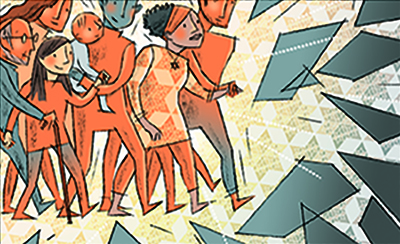Being Jewish
Commentary
Marching Toward Liberation

“Standing on the parted shores, we still believe what we were taught before ever we stood at Sinai’s foot; that wherever we go, it is eternally Egypt; that there is a better place, a promised land; that the winding way to that promise passes through the wilderness. That there is no way to get from here to there except by joining hands, marching together.” —Mishkan T’filah, a Reform prayer book, adapted from Michael Walzer’s Exodus and Revolution
Following God’s directive, Moses told the enslaved Israelites that God “will bring you to the land” as He swore to their ancestors (Exodus 6:8). Despite that promise, neither Moses nor most of the generation he led out of Egypt ever entered the Promised Land. And when we sit down to the first seder on the evening of March 30, we won’t find this promise in the Haggadah. Indeed, the Torah itself ends with a new generation on the precipice. Why is there no happy ending to our formative text?
Perhaps it is because spiritually speaking, we—Jews and all of humankind—are still in the wilderness, not yet fully liberated. Though the ancient Israelites eventually reached the Land of Israel, today, many generations later, we see that oppression and hatred of the other remain potent and destructive.
We have seen many tragic examples of this in the United States over the past year, including last August when torch-carrying white supremacists marched in Charlottesville, Va. I was there to join like-minded friends and colleagues in an interfaith-led counterprotest, organized by the local group Congregate Charlottesville. What I saw there shocked and frightened me: neo-Nazis marching proudly with swastika banners. And even though Virginia, where I live, is an open-carry state, it marked the first time I saw people holding assault rifles.
In the weeks that followed, people of different faiths—Christian, Muslim, Jewish—came together to raise their voices for equality and justice. I spoke at a vigil in Washington, D.C. I followed Defend C’ville’s Twitter account to keep abreast of solidarity events that took place in Durham, N.C., Boston and New York City, where groups such as Black Lives Matter, the pro-immigrant Movimiento Cosecha and SURJ (Showing Up for Racial Justice, a white pro-justice movement) participated, essentially sending the message that “Our love is greater than your fear.” The response was beautiful in its spontaneity and earnestness. It is a shame we only seem to come together in the face of tragedy. What might we accomplish if these group leaders maintained contact as well as a presence in the media in order to continue to advocate for safety to Jews, Muslims, people of color, queer people—all those subject to bigotry.
Before the Charlottesville rally, I read an article by longtime civil rights strategist Eric K. Ward, “Skin in the Game: How Antisemitism Animates White Supremacy,” in The Public Eye, a publication of Political Research Associates. Ward, who is black, points out that many anti-racist activists don’t take anti-Semitism seriously. It is crucial, he wrote, to “recognize that antisemitism is not a sideshow to racism within white nationalist thought…. [It is the] fuel that white nationalist ideology uses to power its anti-black racism, its contempt for other people of color….”
Ward’s observations are a cogent footnote to American history: In the nearly 250 years since the United States was founded, anti-Semitism and other forms of discrimination have not yet been eliminated. But then it also took God 200 years to heed the groaning of the Hebrews and bring them out of slavery and into Israel.
As Jews celebrate our redemption from Egypt, we should also remember that hatred and bias still have not been eradicated from the world. And in philosopher Michael Walzer’s words, there is only one way to leave the wilderness: “by joining hands, marching together.”
Rabbi Lizz Goldstein is the spiritual leader of Reform Congregation Ner Shalom (nershalomva.org) in Prince William County, Va., and teaches at Gesher Jewish Day School in Fairfax.










 Facebook
Facebook Instagram
Instagram Twitter
Twitter
Leave a Reply